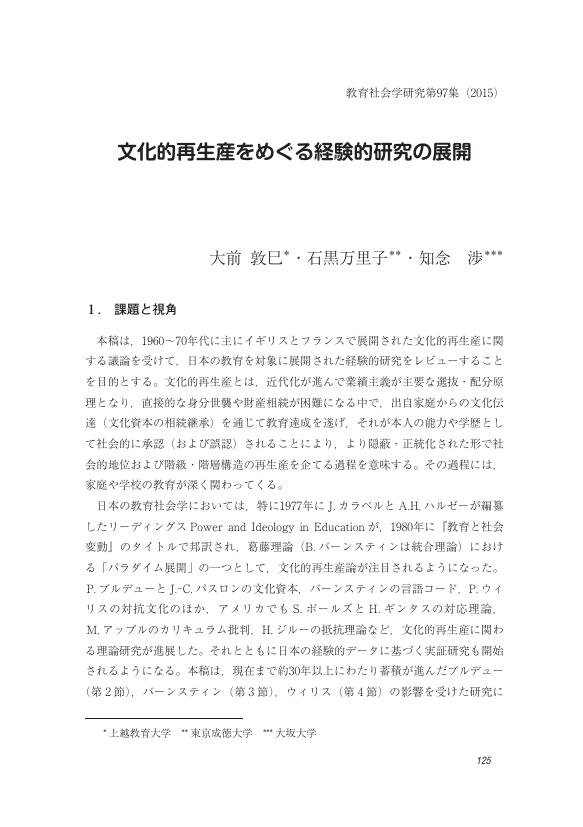5 0 0 0 OA 文化的再生産をめぐる経験的研究の展開
3 0 0 0 OA 保育者の専門性に関する一考察-保育者に固有の「知識」と「判断」-
- 著者
- 石黒 万里子
- 出版者
- 中村学園大学
- 雑誌
- 中村学園大学・中村学園大学短期大学部研究紀要 = Bulletin of Nakamura Gakuen University and Nakamura Gakuen Junior College (ISSN:13477331)
- 巻号頁・発行日
- no.41, pp.1-6, 2009-03-15
- 著者
- 片岡 栄美 小玉 亮子 石黒 万里子
- 出版者
- 日本教育社会学会
- 雑誌
- 日本教育社会学会大会発表要旨集録
- 巻号頁・発行日
- no.60, pp.149-154, 2008-09-19
1 0 0 0 OA 英国における乳幼児期の教育とケア(ECEC)の転型論
- 著者
- 石黒 万里子
- 出版者
- 日英教育学会
- 雑誌
- 日英教育研究フォーラム (ISSN:13431102)
- 巻号頁・発行日
- vol.21, pp.71-84, 2017 (Released:2017-11-11)
- 参考文献数
- 8
This paper examines the radical changes in Early Childhood Education and Care (ECEC) in England since the end of the twentieth century, with special consideration of the global circumstances around ECEC and by using the framework of transitology (Cowen 2014). ECEC in England reflects political, economic, and social changes at a global level, and it has the discourse of ‘school readiness’ as its legitimacy. According to the OECD Report Starting Strong, increasing global interests on ECEC have changed the meaning of ECEC, regarding it as a public good, instead of a private matter, and the report focuses on an integrated approach to ECEC, the goal of achievement and the monitoring of ECEC services, staff and child development. Partly it aims the economic development in the period of low growth. In addition, worldwide organisations such as the WHO, UNESCO and UNICEF also look at ECEC in terms of humanitarian support. They focus on the children’s well-being, promoting health and preventing poverty. ECEC is a hot issue shared across developed and developing countries. As global attitudes toward ECEC have changed, the new ECEC system and curriculum in England has also adapted, including the re-organisation of the governmental division for ECEC in order to integrate the jurisdiction of ECEC, introducing a national curriculum with detailed achievement goals, and monitoring systems for all the ECEC settings. The national curriculum on ECEC in England, Early Years Foundation Stage (EYFS), stresses the importance of care in terms of children’s well-being as well as promotion of literacy, and increasingly such safeguard and welfare requirements have been extended through the revisions of them. ECEC in England is categorised as‘ school readiness’ tradition by the OECD Report. Such a slogan has given the ECEC legitimacy from both points of view: economic growth and humanitarian support, importance in developed and developing countries, and impact of poverty and universal security. However, there are many who oppose the view of school readiness as the aim of ECEC. ‘School readiness’ can be recognised as‘ deductive rationality’ (Cowen 2014). The fundamental question is thus posed - how do we recognise childhood, as a preparation period for being an adult or a meaningful period in and of itself?


